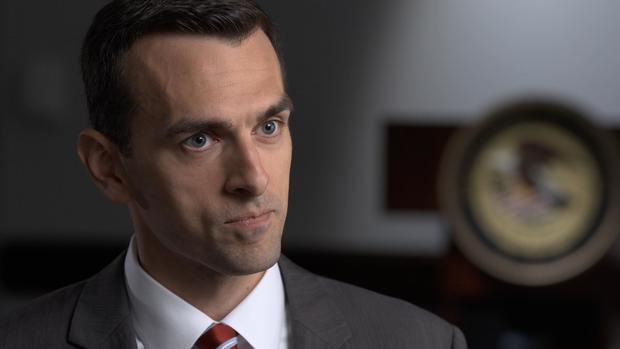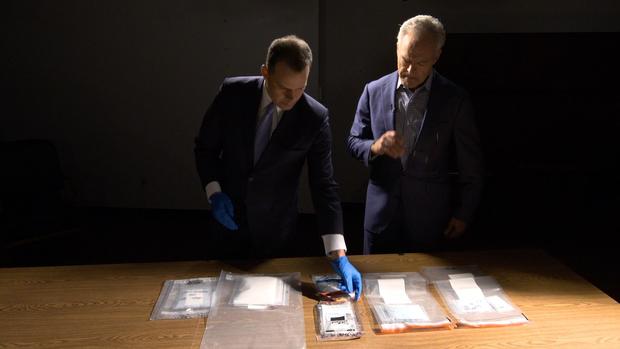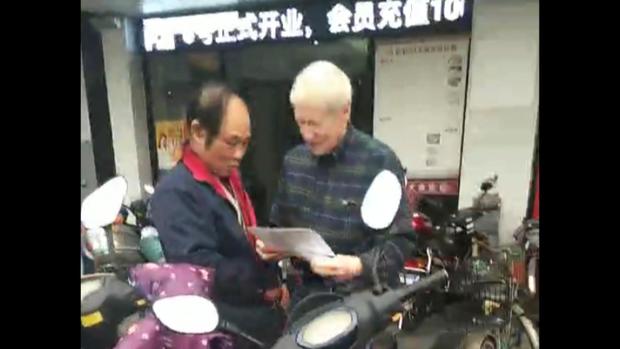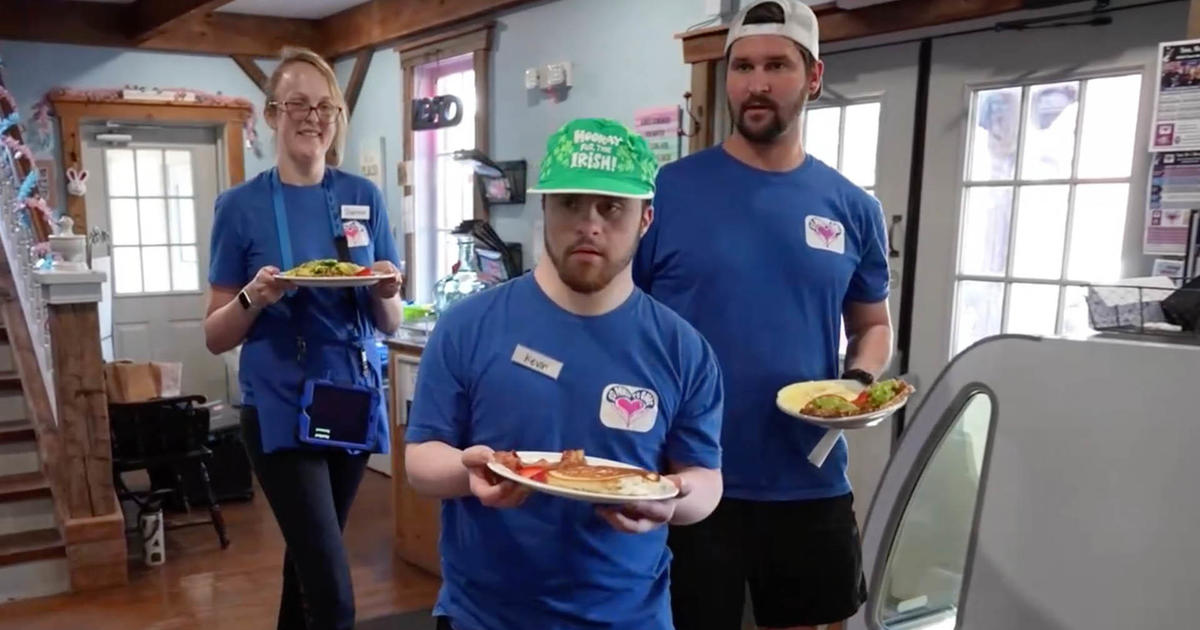Deadly fentanyl bought online from China being shipped through the mail
By now, you may know a family shattered by the opioid epidemic. In 2017, there were 47,000 opioid deaths. That's more Americans than were killed in vehicle accidents or by firearms. One drug, fentanyl, is like rocket fuel in the sharp rise of this crisis. Fentanyl is a painkiller invented in the 1960's and used to relieve the agony of advanced cancer. It is 50 times more potent than heroin. But today fentanyl can be ordered on the internet, by drug dealers and addicts, for an online overdose. Tracking the source of this illicit trade is a story that begins with James Rauh. Like most in Akron, Ohio, he'd never heard of fentanyl until the police told him his son was dead.
James Rauh: They told me that the drug was so powerful that he was unable to finish his injection, and then he died immediately.
Scott Pelley: He didn't even finish the injection?
James Rauh: He'd only, only just started the injection He didn't even have a chance.
James Rauh's son, Tom, was 37 when he died in 2015. He'd started opioids, years before, after an injury. When his prescription ran out, he turned to heroin. He'd been in and out of rehab more than half a dozen times when fentanyl inundated Ohio.
James Rauh: There was something extremely dangerous going on, because Tom was a veteran addict. You know, he knew how to dose himself. He knew how much he could he could handle. I was wondering, how in the world this would get here and who would be selling it?
One week after Tom Rauh's death, the mother of 23-year-old Carrie Dobbins grabbed her phone.
911 OPERATOR: Akron 911 what is the location of your emergency?
MOTHER: My daughter is dead. I just went, got home from work a little bit ago and I went down in the basement. She's dead!
911 OPERATOR: Please stay on the line with me ma'am. You need to be very specific.
MOTHER: I think she did drugs.
Two deaths in Akron in seven days made assistant U.S. Attorney Matt Cronin wonder where all the fentanyl was coming from. The target of an investigation, a low-level drug dealer, had the answer.
Matt Cronin: The target said that he can get any drugs he could ever imagine over the internet from China.
Cronin's investigators went online and discovered overseas labs offering most any illegal drug.
Matt Cronin: We just said, "Hey", according to the source's instructions, "we're interested in buying fentanyl." And the result was, to say the least, surprising. We have dozens, probably over 50 different drug trafficking networks reaching out to us saying, "We have fentanyl. We have even more powerful fentanyl analogs. Whatever you want, we'll get it for you for cheap. We'll get it for you in bulk.
Scott Pelley: You got 50 replies?
Matt Cronin: At least.
Scott Pelley: And all of these came from where?
Matt Cronin: It was universally China.
Scott Pelley: What did you do next?
Matt Cronin: Instead of tryin' to find our way to a target, we had far too many. So we decided to do was go through the list and see any that popped out. And one name in particular struck out, out of the list.
Scott Pelley: What was that name?
Matt Cronin: Gordon Jin.
Scott Pelley: When Gordon Jin was making claims about what he could provide, what did he tell your undercover agents?
Matt Cronin: What Gordon Jin said he could provide to you was essentially any drug you could imagine: those that exist, those that don't even currently exist. He called it custom synthesis. What it really meant was made-to-order poison.
We'll track down the man prosecutors say is Gordon Jin in a moment. But first have a look at fentanyl and its derivatives. Justin Herdman is U.S. Attorney in Cleveland. He told us some of this was seized by the DEA, the rest was found in the mail by U.S. Postal Service inspectors.
Justin Herdman: This is essentially enough fentanyl and carfentanyl to kill every man, woman and child in the city of Cleveland.
Scott Pelley: Just this?
Justin Herdman: Just this.
'Carfentanyl' is a derivative used by veterinarians to tranquilize elephants.
Justin Herdman: Carfentanyl is another 100 times more potent than fentanyl. Here you've got 300 grams of powder that could deliver a fatal dose to 150,000 people. Here you've got only five grams of powder which could deliver a fatal dose to over 250,000 people.
Scott Pelley: So if you touch this stuff, it could kill you?
Justin Herdman: Yeah.
Scott Pelley: Just touch it--
Justin Herdman: There's a reason we have a medic standing by, Scott, and that's because-- an overdose is-- unfortunately it's something that we have to be prepared for, even--even dealing with it in an evidence bag.
Herdman showed us pills that look like prescription opioids but are dangerous counterfeits.
Justin Herdman: Whether it's cocaine, or you think it's heroin, or you think it's pills, it's gonna have fentanyl in it.
Scott Pelley: Why?
Justin Herdman: It's cheaper to buy fentanyl and because it's so potent you can cut it in a way that you can deliver far more doses with a little bit of fentanyl. So it's a profit motive for them.
Scott Pelley: Where did all this stuff come from?
Justin Herdman: It's from China. It's manufactured in China. These are all related to cases that involve the mail or the use of the postal system. So this, somebody put this into a box, sealed it up and sent it through the postal system.
The United States Postal System has been, for many years, the most reliable way to smuggle drugs from China to the U.S.
Rob Portman: That has to stop. It should've stopped years ago.
Ohio Senator Rob Portman's staff investigated the traffic.
Scott Pelley: What did your office's investigation find?
Rob Portman: Shocking, what we found. Which was that people who were trafficking in fentanyl told us, if you send it through the post office, we guarantee delivery. If you send it through a private carrier, not so.
That's because after 9/11, all private carriers like FedEx were required to give U.S. Customs advance descriptions and tracking of foreign packages. The Postal Service was allowed to delay because of the cost.
Rob Portman: They gave the post office some time and said you need to give us a report as to how you can also comply with this. That was 16 years ago, Scott.
Rob Portman In Congress: It's primarily produced in laboratories in China and it's primarily coming to the United States through the United States mail system.
Portman sponsored a bill to force the Post Office to send advance notice of shipments from China. Last fall, the bill became law.
Rob Portman: We now have this legislation in place. They need to implement it quickly. They need to do everything possible to screen these packages coming in.
But the Postal Service was supposed to do that by the end of last year. It says China is not cooperating. About a third of the packages from China, shipped by the U.S. Postal Service still do not have advance content information.
Matt Cronin: The Gordon Jin drug trafficking organization in their own communications and advertisements online say that they ship to five continents in all 50 states. They advertised, and it seemed accurate, they had special ways to bypass customs in the U.S., the UK, the EU and Russia.
Assistant U.S. Attorney Matt Cronin told us that Gordon Jin would often slip fentanyl past U.S. Customs by shipping it to a co-conspirator in the United States posing as a legitimate chemical company. Shipments between chemical companies weren't considered suspicious. A large crate would arrive at the U.S. company. But inside, there would be as many as 50 individual drug packages each addressed to the person who'd ordered them.
Matt Cronin: So they take out these 50 different parcels and send it across the United States and, as I mentioned, even the world.
Scott Pelley: They were going out to the door of the individual people that ordered them online.
Matt Cronin: That's right. We realized that we found Gordon Jin's drug trafficking route, essentially his camouflage to get the drugs into the United States.
According to prosecutors, Gordon Jin is an alias for a father and son drug lab in China. Matt Cronin briefed Chinese Authorities on the evidence, but the Chinese failed to act. Later, a grand jury in the United States indicted the father and son. And they're now wanted in the U.S., but enjoy freedom in China. 60 Minutes producer Bob Anderson found Guanghua Zheng, the father, outside a Shanghai grocery store.
Robert Anderson: This is you and your son. This is put out in the U.S. to arrest you in the U.S.
When Anderson asked Zheng if he was still selling fentanyl in the U.S., Zheng answered with an emphatic. "No! No!"
The woman with him did not like our questions. She tells him, "don't speak, don't speak!" She tells us – "don't come back."
Robert Anderson: Will the Chinese government ever arrest you? Will the Chinese government ever arrest you?
He said, "The Chinese government has nothing to do with it."
Robert Anderson: What do you say to parents? What do you say to parents whose children died from taking your drugs?
Zheng had no answer for that, but he had had enough of 60 Minutes.
Prosecutors say the fentanyl that killed Carrie Dobbins and Tom Rauh came from the Gordon Jin lab in China and arrived in Akron via the U.S. Postal Service.
Matt Cronin: The thing that got me the most, though, was how brazen they were. They wrote a blog and posted it on a website about how they create a certain type of synthetic narcotic. And they stated in that blog that it's tied to overdoses. In other words, that it's so potent it can kill you.
Scott Pelley: Why would they want to associate themselves with people who'd died using these drugs?
Matt Cronin: The unfortunate truth is that when you have an addict sometimes they're seeking the greatest high possible and that can be the high that comes closest to death.
Scott Pelley: And so they were bragging
Matt Cronin: Absolutely.
Scott Pelley: That their drugs were so potent that people had overdosed and died.
Matt Cronin: They were the best out there. That's right.
Their boast was tragically true for the son of James Rauh.
James Rauh: It destroys families. Because what happens to a family is a person gets sick and you're trying to help them, and you're trying to do everything that you can. And then you lose them, and so you suffer, you suffer up to that point and then you suffer when they die and then you suffer afterwards because you coulda stopped it. You feel that every single day. You think, "What could I have done to stop this from happening to my family?" I was in charge. I didn't do this right, and it's--it's breaking my heart.
The U.S. has sealed off the overseas bank accounts of Guanghua Zheng and his son. The feds also shut down what prosecutors say were the Zheng's 40 websites selling illegal drugs in 20 languages. We don't know if their lab shut down, but the network has been, at least for now.
Matt Cronin: It is a fact that the People's Republic of China is the source for the vast majority of synthetic opioids that are flooding the streets of the United States and western democracies. It is a fact that these synthetic opioids are responsible for the overwhelming increase in overdose deaths in the United States. And it is a fact that if the People's Republic of China wanted to shut down the synthetic opioid industry they could do so in a day.
China has been criticized by the U.S. government for failing to put the many forms of fentanyl on its list of controlled drugs. Now, in a concession, China says, next month, all derivatives of fentanyl will be on its list. But U.S. law enforcement remains skeptical about whether China will crack down.
Produced by Pat Milton, Robert G. Anderson and Aaron Weisz









